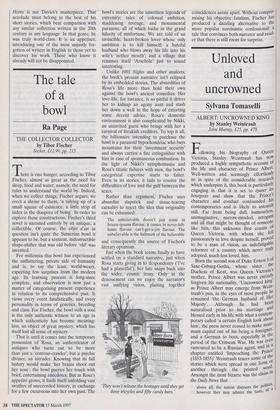The tale of a bowl
Ra Page
THE COLLECTOR COLLECTOR by Tibor Fischer Seeker, £12.99, pp. 215 There is one hunger, according to Tibor Fischer, almost as great as the need for sleep, food and water; namely, the need for rules to understand the world by. Indeed, when we collect things, Fischer argues, we erect a shrine to them, 'a tidying up of a small square of existence, a little strip of index in the diaspora of being'. In order to explore these constructions, Fischer's third novel is narrated entirely by an antique, a collectible. Of course, the objet d'art in question isn't quite the Sumerian bowl it appears to be, but a sentient, indestructible shape-shifter that was old before 'old' was invented.
For millennia this bowl has experienced the unflattering, private side of humanity and is, to say the least, world-weary, expecting few surprises from the modern age. Its learning process is long-since complete, and observation is now just a matter of categorising present experience in relation to its comprehensive past. It views every event fatalistically, and every personality in terms of genetics, breeding and class. For Fischer, the bowl with a soul is the only authentic witness to an age in which authenticity has become meaning- less; an object of great mystery, which has itself lost all sense of mystery.
That is until it comes into the temporary possession of Rosa, an authenticator of antiques who turns out to be more than just a 'contour-crawler', but a psychic diviner, an intruder. Knowing that its full history would make 'her brains shoot out her nose', the bowl parries her touch with brief, entertaining anecdotes. But as Rosa's appetite grows, it finds itself unfolding vast swathes of unrecorded history, in exchange for a few excursions into her own past. The bowl's stories are the unwritten legends of extremity; tales of colossal ambition, maddening revenge, and monumental paranoia, all of which bathe in the grand hilarity of misfortune. We are told of an invincible, heart-broken lover whose only ambition is to kill himself; a hateful husband who blows away his life into his wife's 'nether mouth'; and a village that renames itself 'Arsehole' just to sound interesting.
Unlike 1001 Nights and other analects, the book's present narrative isn't eclipsed by its embedded stories. The absurdities of Rosa's life more than hold their own against the howl's ancient comedies. Her love-life, for instance, is so pitiful it drives her to kidnap an agony aunt and stash her down a well in the hope of extorting some decent advice. Rosa's domestic environment is also complicated by Nikki, an uninvited guest who brings with her a carnival of freakish creditors. To top it all, the billionaire intending to purchase the bowl is a paranoid hypochondriac who buys mountains for their 'investment security' and always carries a fire extinguisher with him in case of spontaneous combustion. In the light of Nikki's nymphomania and Rosa's titanic failures with men, the bowl's categorical expertise starts to falter. Even in its stories, it fails to resolve the difficulties of love and the gulf between the sexes.
Rather than argumeni, Fischer uses absurdist slapstick and tissue-tearing carnality to reject the idea that originality can be exhausted:
The unbelievable doesn't just come in frozen-iguana flavour, it comes in never-left- home flavour, can't-get-a-job flavour. The unbelievable is the hallmark of the believable
and consequently the source of Fischer's literary optimism.
Just when the book seems finally to have settled on a standard narrative, just when Rosa starts giving in to despondency (`I've had a planetful'), her fate snaps back into the wider, cosmic irony. Only in the denouement can we enjoy the narrator's vast unifying vision, plaiting together `They won't release the hostages until they get three tricycles and fifty candy bars.' coincidences aeons apart. Without compro- mising his objective fatalism, Fischer has produced a dazzling alternative to the more popular narcissistic confessional: a tale that convinces both narrator and read- er that there is still room for surprise.


































































 Previous page
Previous page